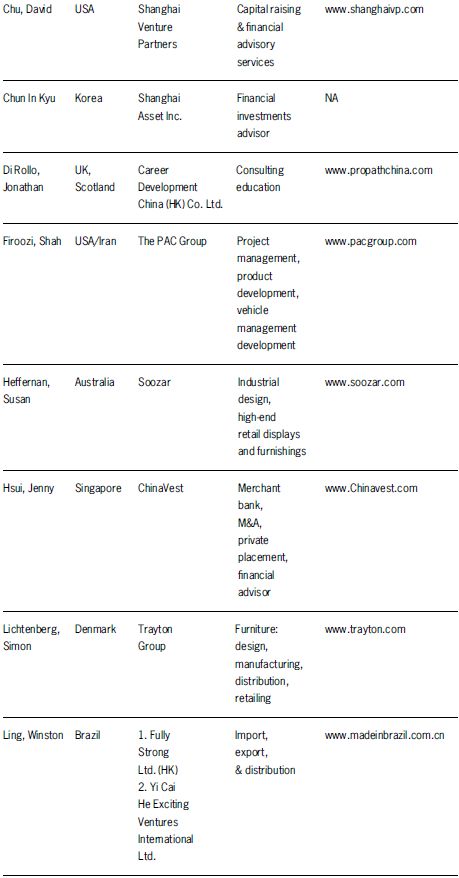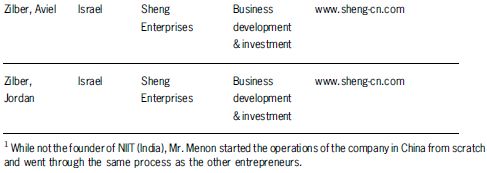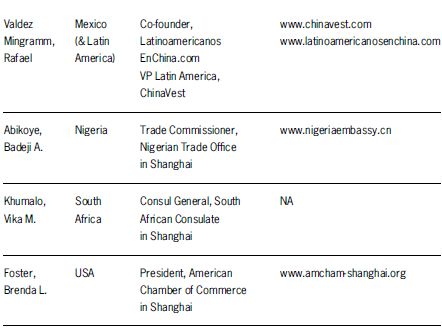Introduction
“We had a couple of crazy experiences that tested my commitment to starting my company in China. Our first customer was also a potential competitor, a well connected local company. They had a very large deal with us (but later) . . . I guess they felt threatened that we would take away their customer. That wasn’t my intention, but they still felt threatened.
They knew we hadn’t got our business license yet, and that we were very poorly funded, so they decided to attack us. Their intention was to try to scare me out of China, and force my staff to join them. What they did was tell the police in Hangzhou that we had placed an espionage code into the telecom system. That is a very serious offense in China. It wasn’t true, but who knows whether truth is the deciding factor in these cases in China?
So, one Friday afternoon, at 5.30, the police showed up at our office. It was a very dangerous situation because I didn’t have a business license, so I didn’t have any ground to stand on. I didn’t have a lawyer either, as I’d never really needed a lawyer before. The police locked our door and put a seal across it. I thought I was going to be arrested for espionage!”
Interviewee, China Entrepreneur
Why Read China Entrepreneur?
Have you ever dreamed of launching a business venture in the world’s largest, fastest growing, and most dynamic consumer market? Many adventurous businesspeople from around the world have dreamt this dream, and more are joining them as China matures, opens, and internationalizes.
But as the anecdote in previous page shows, launching an enterprise in China can be fraught with more perils than even the most adventurous businessperson might anticipate. (For the full story of the fake espionage case, see the case study titled “The Price of weak Guanxi” on pages 154–155.)
It was the stories which foreign entrepreneurs in China shared with us of their “big China dreams” — as well as their “China nightmares”—that inspired us to embark on writing China Entrepreneur: Voices of Experience from 40 International Business Pioneers.
In the year following the release of our first book, China CEO: Voices of Experience from 20 International Business Leaders (John Wiley & Sons, 2006), the reception from readers worldwide was far beyond our expectations. Within 18 months, the book had sold 25,000 copies in English and had been translated into Chinese (both traditional and simplified characters), Vietnamese, Indonesian, and Korean.
Since the first book’s launch, we authors have spoken to thousands of businesspeople in Asia, Europe, and America, all of whom share an interest in doing business in China. Most satisfying have been the numerous times we have spoken with business executives working in China, who have commented: “This is exactly what I went through when I got here. I’m going to give this book to my new directors coming into China from Europe (or the U.S., or Australia, or India . . .).”
But another message we heard quite often, whether we were speaking to business associations, chambers of commerce, trade delegations, or business school students, was this: What about small business owners entering China? As one Australian businesswoman said during a book talk: “I’m not GE. I’m just me. I don’t have an army of people helping me deal with the government here. What advice do you have for me?”
So, in 2008, we again ventured into the China market with our digital recorders in hand to collect first-hand accounts of foreign (non-Chinese) businesspeople who had succeeded in launching their own businesses in the China market. Using our differing strengths in academia and business journalism, we aimed to produce a meticulously researched, yet easy-to-read guide to starting and managing a successful small business in China. As with China CEO, we sought to draw upon our strong points—Dr. Juan Antonio Fernandez’s strengths as a professor of Management at the China Europe International Business School, where he has taught since 1999, and Ms. Laurie Underwood’s 15 years of business journalism expertise in greater China (before joining CEIBS as Director of External Communications and Development).
More “Blood, Sweat, and Tears”
In crafting China Entrepreneur, we began by interviewing a select profile of business pioneers—expatriates who had successfully launched a business of their own in China, rather than executives who had been sent to China with the backing of a well-established multinational corporation. Although we had originally planned to interview the founders of 20 successful startups, we ended up talking with twice that number. Each interview seemed to lead to yet another pioneer with another fascinating tale of having triumphed over the business challenges that the entrepreneur faces in China. Several weeks into the project, we knew we were gathering valuable material for a second book. As one of our draft manuscript readers, Shanghai-based entrepreneur John Van Fleet, put it: “There is a lot of blood, sweat, and tears in these interviews.”
Who is in This Book?
By the time we had finished interviewing for China Entrepreneur, we had painstakingly tape-recorded, videotaped, and transcribed detailed interviews with 52 experts on China, each offering a wealth of insights into their experiences in this unique—and uniquely challenging—market.
Our interviewees are composed of three types of experts:
Profile of the Entrepreneur Interviewees
While our pioneers hail from 25 countries and provinces, they have certain shared characteristics. The average interviewee is aged 47, has an MBA, is married, has been in China for 12 years, speaks basic-or-above Chinese, and has been operating his or her current business for nine years. Among the 40 interviewees, 33 are men, and seven are women. (In China CEO, all 20 of the CEOs we interviewed were men, as we were unsuccessful in finding women CEOs to interview.)
China Entrepreneur interviewees’ countries/provinces of origin are as follows:
- North America: 10 (United States, 9, Canada, 1)
- Latin America: 2 (Brazil, 1, Mexico, 1)
- Europe: 13 (Belgium, Denmark, France, Netherlands (3), Ireland, Italy, Macedonia, Spain, Switzerland, U.K. (England, Scotland))
- Middle East: 4 (Iran, Israel (2), Turkey)
- Asia: 8 (India, Japan (2), Korea, Taiwan (3), Singapore)
- Australia: 1
- Africa: 2 (Morocco, South Africa)
“The composite profile of the China entrepreneurs we interviewed would be a 47-year-old who has lived and worked in China for 12 years, speaks Chinese well, has an MBA, is married, and started his or her own business nine years ago.”
The Authors, China Entrepreneur
Their places of origin are indicated on the map.

In total, our 40 entrepreneurs have a combined 500 years of experience in China.
In terms of education, the most popular degree among our interviewees was MBA (17), followed by Bachelor of Arts (13), while five had advanced degrees (three master’s degrees and two PhDs). Concerning Chinese language ability, aside from our four native Chinese speakers (who held non-Chinese passports), most had achieved an intermediate (15) or advanced (11) level of Chinese. Only three interviewees said they had a “less-than-basic” ability in Chinese. Most were married (30). In 12 of these cases, their spouses were from greater China (including Taiwan).
Our interviewees represent a full range of business sectors. In addition, our featured entrepreneurs run the gamut of business operations. In terms of their China operations, 22 of the interviewees operated a foreign invested enterprise (FIE), while 14 ran an offshore entity or a representative office, and seven operate as Chinese-owned companies (via a Chinese partner). In total, our 40 entrepreneurs have a combined 500 years of experience in China.
The following tables introduce our interviewees in more detail. Table 1 identifies the entrepreneur interviewees.
TABLE 1 Entrepreneur Interviewees





The seven consultants listed in Table 2 contributed to this book in terms of both their experience as China-based entrepreneurs and their expertise as consultants to hundreds of clients in China.
TABLE 2 Consultant-Entrepreneur Interviewees

The three expert advisors listed in Table 3 added their experience in the fields of entrepreneurship, negotiation, and law in China.
TABLE 3 Expert Advisor Interviewees

Finally, the nine country representatives listed in Table 4 added insights on doing business in China from the perspective of the countries they represent. These interviews appear as an appendix at the end of the book.
TABLE 4 Country Representative Interviewees (country by alphabetical order)


“I think people should talk to other entrepreneurs. Recently, I was involved in a young entrepreneur organization. I realized that I should have been involved in it at the very beginning, because people here tell you the real stories. You hear real stories from people who have been through it before.”
Susan Heffernan (Australia), Founder and Managing Director, Soozar
What We Cover
The goal of China Entrepreneur is simply this: to help non-Chinese businesspeople who are interested in doing business in the Middle Kingdom to clearly understand the challenges, risks, and opportunities. Our focus on small businesses and startups helps to outline the challenges faced by pioneers who launch and operate their own ventures, rather than beginning in China with the backing of a global company. As one of our entrepreneurs told us, “I think people should talk to other entrepreneurs. Recently, I was involved in a young entrepreneur organization. I realized that I should have been involved in it at the very beginning, because people here tell you the real stories. You hear real stories from people who have been through it before.”
The purpose of our book is to collect and share those “real stories” and real advice from real China entrepreneurs.
